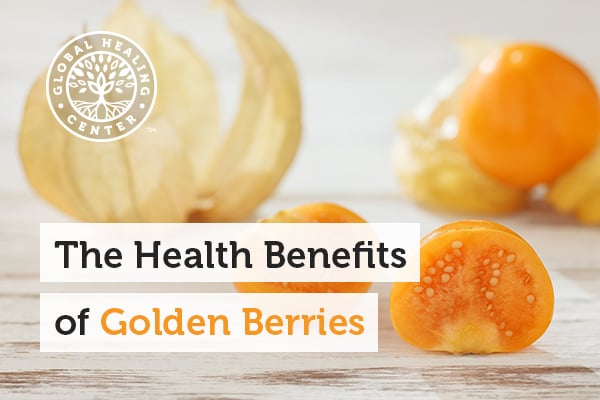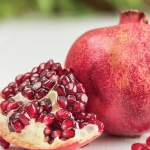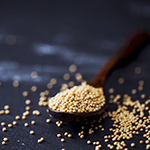
Golden berries, also known as Physalis peruviana, is South American fruit that's highly concentrated with nutrients and bioactive compounds. In Colombia, the delicious golden berry is an important international export and prominent local food. [1] The plant has been used for centuries in traditional medicine, often against jaundice. [2] While the evidence for golden berry application for jaundice remains anecdotal, research has found other positive health benefits associated with the fruit.
Golden Berry Nutrition Facts
Resembling a golden raisin but with a flavor that's more sweet and tart, golden berries are extremely nutrient dense superfoods with easily absorbable bioavailable compounds. Golden berries contain linoleic and oleic acid, two essential fatty acids that aid in insulin sensitivity and fat oxidation. [3] There is also some research suggesting the fatty acids’ effectiveness for promoting good health in general. [4]
Compared to other small berries, golden berries are higher in protein and vitamin A and they're much lower in sugar. They're also loaded with antioxidants. Phytochemical screening has revealed an abundance of flavonoids as well. [5] Flavonoids are specific antioxidants that promote cardiovascular health and other benefits.
The Health Benefits of Golden Berries
Plants used in traditional medicine have drawn the attention of researchers who seek to develop new therapeutic agents for a wide range of diseases. In folk medicine, golden berries have many applications and many cultures regard golden berries as a mild diuretic that promotes proper fluid balance. [6] Other ways that golden berries encourage good health include...
Normal Blood Sugar
Starch and sugar are broken down in the body through an enzymatic reaction, a process that can increase blood sugar levels. Studies suggest that golden berries may be helpful for inhibiting the enzyme responsible for this reaction and preventing the breakdown of starchy carbohydrates; thus controlling the impact carbohydrates have on blood sugar. [7]
Discourages Systemic Redness and Swelling
Illness and irritation can cause redness and swelling in the body; it's indicative of many diseases. [8] Research conducted by the National University of Colombia confirms that golden berries offer potent activity against systemic redness and swelling. Golden berries present an immunomodulatory effect which directly (and indirectly) blocks the affected mediators. [9] In layman’s terms, golden berries fight redness in the body by reducing the impact of proteins that cause the redness. [10]
Liver, Kidney, and Organ Health
In late 2013, Egypt's National Research Center's Department of Medicinal and Aromatic Plants reported that golden berries may offer potent liver and kidney benefits, possibly protecting against the “scarring” of liver tissue. [11] Liver health is especially important, as it's the body's main detoxifying organ. Its anti-redness and antioxidant compounds may be effective for protecting other organs, including the lungs. In fact, preliminary research is even examining the potential for a primary compound in golden berries, 4 beta-Hydroxywithanolide, as a potential therapy for lung cancer.
Have You Tried Golden Berries?
There's no question that research into golden berries has uncovered much to think about concerning their positive effects on human health. However, one of the best reasons to snack on golden berries is because, like goji berries and chia seeds, they're a delicious and healthy snack! They're loaded with nutrients and antioxidants and go great on a salad, in trail mix, or even by themselves. Their sweet, tart taste is unique; they're a perfect example of a fruit that's even better than candy!
References (11)
- Urrea R, Cabezas L, Sierra R, Cárdenas M, Restrepo S, Jimenez P. Selection of antagonistic bacteria isolated from the Physalis peruviana rhizopshere against Fusarium oxysporum. Journal of Applied Microbiology. 2011 September;111(3):707-16. doi: 10.11111/j.1365-2672.2011.05092.x.
- Simbaqueba J, Sanchez P, Sanchez E, Nunez Zarantes VM, Chacon MI, Barrero LS, Marino-Ramirez L. Development and characterization of microsatellite markers for the Cape gooseberry Physalis peruviana. PLoS One. 2011;6(10):e26719. doi: 10.1371/journal.pone/0026719.
- Choi JS, Koh IU, Jung MH, Song J. Effects of three different conjugated linoleic acid preparations on insulin signalling, fat oxidation and mitochondrial function in rats fed a high-fat diet. British Journal of Nutrition. 2007 August;98(2):264-75.
- Beppu F, Hosokawa M, Tanaka L, Kohno H, Tanaka T, Miyashita K. Potent inhibitory effect of trans9, trans11 isomer of conjugated linoleic acid on the growth of human colon cancer cells. The Journal of Nutrition and Biochemistry. 2006 December;17(12):830-6.
- El-Gengaihi SE, Hamed MA, Khalaf-Allah Ael-R, Mohammed MA. Golden berry juice attenuates the severity of hepatorenal injury. Journal of Dietary Supplements. 2013 December;10(4):357-69. doi: 10.3109/19390211.2013.830675.
- Franco LA, Matiz GE, Calle J, Pinzon R, Ospina LF. Anti-inflammatory activity of extracts and fractions obtained from Physalis peruviana L. calyces. Biomedica. 2007 March;27(1):110-5.
- Pinto Mda S, Ranilla LG, Apostolidis E, Lajolo FM, Genovese MI, Shetty K. Evaluation of antihyperglycemia and antihypertension potential of native Peruvian fruits using in vitro models. Journal of Medicinal Foods. 2009 April;12(2):278-91. doi: 10.1089/jmf.2008.0113.
- Reuter S, Gupta SC, Chaturvedi MM, Aggarwal BB. Oxidative stress, inflammation, and cancer: how are tehy linked? Free Radical Biology & Medicine. 2010 December 1;49(11):1603-16. doi: 10.1016/j.freeradbiomed.2010.09.006.
- Martinez W, Ospina LF, Granados D, Delgado G. In vitro studies on the relationship between the anti-inflammatory activity of Physalis peruviana extracts and the phagocytic process. Immunopharmacology and Immunotoxicology. 2010 March;32(1):63-73. doi: 10.1080/08923970903143957
- Pardo JM, Fontanilla MR, Ospina LF, Espinosa L. Determining the pharmacological activity of Physalis peruviana fruit juice on rabbit eyes and fibroblast primary cultures. Investigative Ophthalmology & Visual Science.
- El-Gengaihi SE, Hamed MA, Khalaf-Allah Ael-R, Mohammed MA. Golden berry juice attenuates the severity of hepatorenal injury. Journal of Dietary Supplements. 2013 December;10(4):357-69. doi: 10.3109/19390211.2013.830675.
†Results may vary. Information and statements made are for education purposes and are not intended to replace the advice of your doctor. If you have a severe medical condition or health concern, see your physician.







